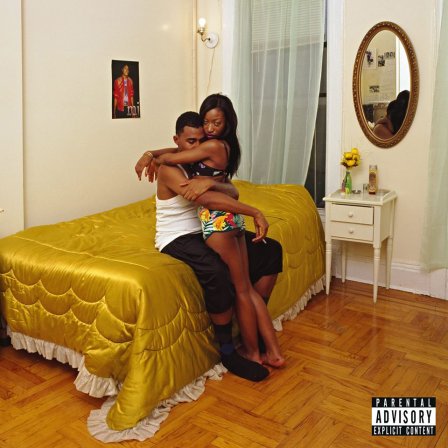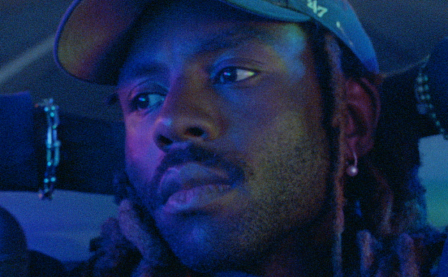Freetown Sound, like the Sierra Leone locale which it takes its name from, the birthplace of Devonté Hynes’s father, is a half-truth of a name, like America: free in theory but questionably in practice. Because while Saint Augustine of Hippo, Latin name Aurelius, was likely the (black) ancestor of freed slaves, history saw that his enduring intellectual and theological legacy bound him back to white supremacy. Whitewashed. Much like in the Boogie Down Productions sample that kicks off “Chance”: “Genesis, chapter 11, verse 10/ Traces the genealogy of Shem/ Shem was a black man, in Africa/ If you repeat this fact, they can’t laugh at ya,” a verse that goes on to trace this lineage to the prophet Abraham.
Erasure of black bodies has been a near-constant practice since these times, whether through the whitewashing and censorship of black luminaries in thought or the wholesale obfuscation of violence against black bodies. As Hynes reminds us on the Million Man March-sampling, Trayvon Martin-referencing “Hands Up,” “Sure enough they’re gonna take your body” — Western (a.k.a. White) history constitutes a deliberate disembodiment of the black person. This history has re-impacted viciously in the weeks following the release of Freetown Sound, with the police executions of Alton Sterling in Louisiana and Philando Castile in Minnesota, the latter case constituting what was essentially the live, real-time virtual broadcast of a lynching.
Freetown Sound does exist within the social climate and material conditions that gave way to such an event (again and again and again), but it would only be feeding the reductionist ideologies of white supremacy to box it into a representation of blackness, which if anything it seeks to destabilize as much as affirm. In its spiraling, non-terminating intertextuality, in its echoing refrain of the exploration of queer black identity, in its refusal to attempt to distinguish lyrically between interior monologue and massive political topicality, Freetown Sound is a clapback, a healing song, a historical re-embodiment of the (infinite number of) (also) black experience(s) contained within the vantage of a single individual.
And while there are comparisons, musically, to be made to Prince, to Paul’s Boutique, to West African and Caribbean pop styles and a whole cascade of references, it’s clear that Hynes’s kaleidoscopic explosion of his own experience of the world thrives on a quivering immediacy of interrelation between things that, while frequently serving to remind the listener how the machinery of oppression is still (maybe more now than ever) entrenched in the world we wake up in and collectively perform every day, reveals a teeming unity of of which love for self and others cultivates and flows. Hynes sings on the Michael Jackson-reminiscent “But You,” “And if you don’t know that means/ Don’t tell me that it’s true/ Teach yourself about your brother/ ‘Cause there’s no one else but you/ You are special in your own way.” This earnest lovingkindness, though a common lyrical mode on the record, always spiders out into an ambivalent intertextuality that calls to more troubled relations with self-identity, such as the Marlon Riggs “Black Is… Black Ain’t” excerpt featured on “With Him,” the Venus Xtravanganza interview from Paris Is Burning that bookends “Desirée,” or the Ta-Nehisi Coates monologue snippets that “Love Ya” gives way to.
Any public act of self-expression is subject to the holographic spectral projections of representation, which bend to the patently asymmetric flows of power, even as it presently rearranges them; and these rumbling interstitials unearth a skin-deep unease belying Freetown Sound’s pop-ready vibe. And as we’ve seen in the weeks directly following this record’s release, the skin, the first layer, the first impression is only as deep as anything needs to go to have devastating effects. And so while this is a record of healing, of rooting down into self and freeing oneself into a realm where identity is not the last word, it is also one that knows too well how the last word can be replaced by a voice that isn’t yours.
There is a chorus of voices present on this record, from those Hynes samples to the pop stars he inconspicuously calls up to sing in harmony or call-and-response with him (Debbie Harry, Nelly Furtado, Carly Rae Jepsen), to the various modes of communication that arise from his own vantage, at turns introspective and transparent, at other turns approaching something like opaque observation. In the holographic body of work that constitutes its referents and execution, Freetown Sound in its best moments gives off an aura that’s shimmering and translucent, in material sound and in composition, returning again and again to that platonic ideal of a haunting refrain at junctures that place listeners in an eternal vantage to bear witness to a cycle of erasure, folding into, rupture, and reclamation: “You chose to fade away with him/ I chose to try and let you in.”
And while I make that relatively neutral aesthetic appraisal, a generalization, rhetorically impossible to really disagree with because of how generally it comments on the source material, in attempting to review at a record like Freetown Sound as a white man (especially at this point in time), I am not entirely unlike Justin Timberlake when he tweets “#inspired” following Jesse Williams’s speech at the BET Awards. Erasure erases itself, too, hides from Timberlake, too, tells me to erase my white self from this writing. Long before Hynes showed up at an A$AP Rocky and Tyler, The Creator show in Brooklyn and saw the girl with the thick blonde braids and thought to himself No one really cares what Thug Life means (The Hate U Gave Little Infants Fuck Everybody), Timberlake made a career of embodying blackness on stage, channeling the emotional, cognitive, and physical labor of black songwriters, choreographers, and dancers, simultaneously erasing the experience of that labor while representing its "transcendent" aura. White writers attempted to extract that same transcendent particle from black culture, bearing judgement on a real, material industry that has flesh-and-blood, brick-and-mortar ( however you term it) effects, subtly interpellating the "magic" of blackness into a culture industry that only perpetuates the same cycles, delimits, isolates, and narrows the options for what blackness can mean while reserving the luxury of the imagination for those who control the language of domination.
But this transcendence of having correctly and fully perceived a phenomenon like culture through the representative lens of a performance of a person is a myth. one that's at the crux of the endless propagation of white supremacy. It is not our place to give St. Augustine back his body; he has already built it to outlast us.
The last word, then, goes to Devonté Hynes:
"I could never force your way/ The way you speak about your face/ I know that it’s not mine to change/ Know that it’s not mine to change.”
More about: Blood Orange




